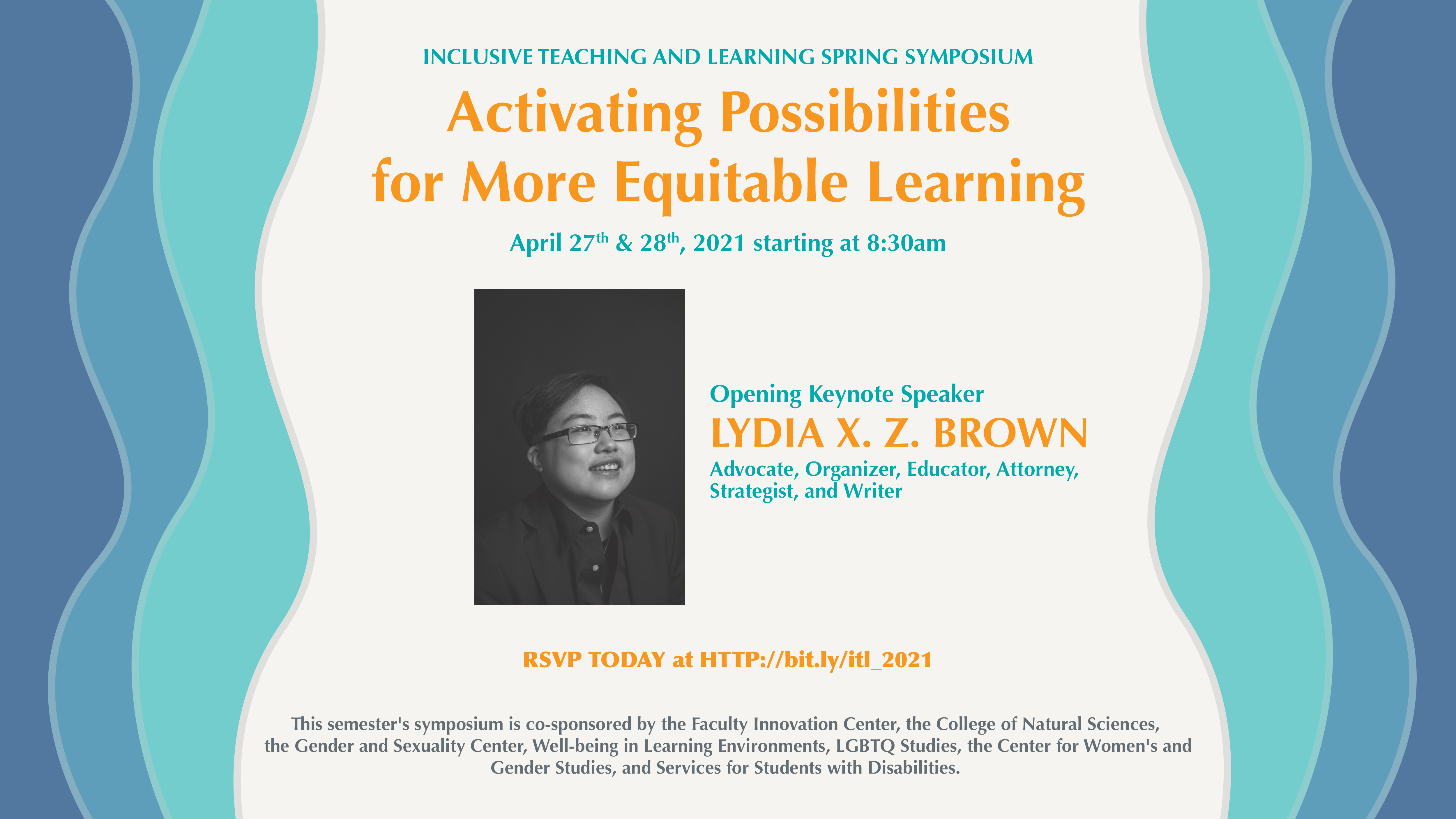Please join us for the Faculty Innovation Center's sixth biannual Inclusive Teaching and Learning Symposium. Day one will take place on Oct. 27. The theme for this fall's symposium is Activating Inclusivity in Learning Environments, and we've identified the following guiding questions to center our presentations and keynote speaker around:
- How does my positionality hinder action or empower me to take action?
- What tools am I using on campus to take action toward anti-racism?
- How can I incorporate anti-racism in my learning environments?
The Symposium will kick off with a keynote presentation from Dr. Nicki Washington, Professor of Practice of Computer Science at Duke University, and will be followed by a series of one-hour interactive, activating workshops spread over two days.
Scheduled Sessions for Day 2 (Thursday, October 29)
- 9:00am-10:00am Workshop Session 3: Embodiment and Feedback: Drama Techniques for Receiving Feedback about Inclusivity
Facilitated by Kairos Looney, Graduate Student, Theatre and Dance
Many instructors on campus, including myself, who are invested in inclusivity and anti-racism get caught up trying to be good educators and activists, such that we do not develop our ability to receive feedback from our colleagues, students, and staff about our own exclusionary and racist behaviors and practices. This workshop will address three questions: (1) How can we reframe our understanding of feedback to honor the labor and trauma that frequently goes into giving feedback, especially within university power differentials? (2) How then in the moment can we receive feedback and resist getting defensive? (3) How can we come back into our bodies when we are given feedback?
Attendees will have the following takeaways from this workshop: 1. Increased awareness of how many bodies instinctively respond to feedback. 2. Tools for responding more openly. 3. Questions we can ask ourselves to think critically before offering feedback ourselves. 4. Exposure to and discussion of concepts I have found really helpful in my own ongoing process.
- 10:15am-11:15am Workshop Session 4: Imposter Syndrome and the Learning Environment
Facilitated by Nisha Saif, Camila Bohorquez, and Christy Gao, CMHC Undergraduate Peer Educators
Imposter syndrome impacts 70% of the student population, and it is especially prevalent among minority students. In this workshop, we will explore the topic, scope, and context of imposter phenomenon as it impacts minority student success and well-being at UT, and the ways faculty play a role in promoting an inclusive learning environment, before ultimately recommending strategies to create a more inclusive learning environment and alleviate imposter phenomenon among students by promoting a growth mindset within academic spaces. By reintroducing student voices into the pedagogical arena, we will create space for reflection about individual teaching philosophies.
Our workshop will provide instructors with recommendations that can be implemented to promote a more inclusive learning environment and reduce imposter syndrome among students. Specifically, this will include ways to promote a growth mindset in the classroom, and how to create a valuable learning experience with less dependence on grades as a measure of success.
- 11:30am-12:30pm Workshop Session 5: BeVocal Co-Conspirators
Facilitated by Sahtiya Hosoda Hammell and Whitné Mousson, BeVocal
This workshop engages with the BeVocal initiative to address how to intervene across the spectrum of harm by recognizing the discomfort inherent in advocating for more inclusive environments, and being vulnerable and accepting of the potential for missteps along the journey. This session asks participants to envision a community that engages and invests in everyone’s safety and well-being, and will empower individuals to use their positionality to foster inclusive communities, both directly and indirectly. Discussions will center around the impacts of structural racism and scenarios geared specifically to issues involving race.
This workshop will utilize a three-step action plan of 1) recognize potential harm 2) choose to respond and 3) take action. Participants will learn how to help individuals make the LEAPS from being defensive about causing harm by Listening, Empathizing, Asking Questions, Paraphrasing and Summarizing and learning how to offer THANKS (Thanks, Hold your tongue, Apologize, Network, Know better and Do better, and Share Ideas) when mistakes are made.
Special Graduate Student-Only Session
- 3:00pm-3:45pm Q&A with Dr. Nicki Washington
Graduate students can RSVP for a curated Q&A session with Dr. Washington on Thursday 10/29 at 3:00pm by registering for the Symposium. Attendees will have the opportunity to submit questions in advance at the time they RSVP in order to help Dr. Washington respond to as many questions as possible.
Register to receive Zoom links for the Symposium sessions.
This symposium is is made possible by the Mellon Foundation “Creating a Shared Culture of Inclusive Pedagogy” grant, as well as sponsorships from the Cockrell School of Engineering, the College of Natural Sciences, the Department of Computer Science, the Women in Engineering Program, and the Texas Institute for Discovery Education in Science.


